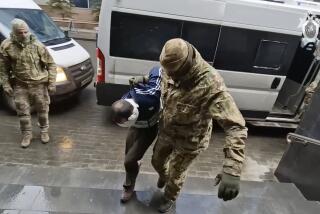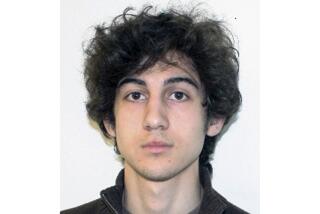Festering Chechen militancy not just Russia’s problem
- Share via
Initial reports on the possible motives for two Chechen brothers suspected in the Boston Marathon bombings suggest there was little if any instigation from their volatile Russian homeland or an international Islamic militant force such as Al Qaeda.
But as the Chechen people’s battle for freedom from Russian domination continues to fester nearly two decades after the first uprising against Moscow, the risks to the outside world are nonetheless apparent.
Chechen fighters nurturing hopes of their predominantly Muslim territory breaking away from Russia have traveled to Afghanistan, Pakistan and neighboring Caucasus regions for military and explosives training, joining their cause to a global network battling perceived repression and injustices suffered by Islam’s adherents.
Chechen militants and foreign supporters who were training at Al Qaeda-run camps in Afghanistan were among the terror suspects swept up after the U.S. invasion in October 2001 and imprisoned at Guantanamo Bay or CIA “black sites,” some still believed to be in indefinite detention.
Chechen warlords also have been added to the U.S. list of terror suspects, most recently in February 2011 when Doku Umarov was branded a fugitive enemy after he claimed responsibility for organizing the suicide bombings on Moscow’s subway in 2010 that killed at least 40 people.
Thousands of Chechen civilians, just as the Boston suspects, Dzhokhar and Tamerlan Tsarnaev, have fled the restive Caucasus republic since the first uprising for independence began in December 1994, scattering aggrieved refugees across Europe and the United States. That has created a diaspora of hostile emigres vulnerable to recruitment into militant Islamist causes, such as 25-year-old Lors Doukayev’s attempt to bomb the Danish newspaper Jyllands-Posten after it published cartoon-like images of the prophet Muhammad.
Emigre Chechens have been arrested as recently as a month ago in France and others have been prosecuted in Spain and Austria for alleged involvement in bomb plots against foreign targets.
Muslim communities in the Caucasus lived under the atheistic and cultural oppression of Soviet Russia for most of the previous century, but secessionist sentiments rekindled after the 1991 breakup of the Soviet Union. The uprising in 1994 provoked a brutal crackdown by the Russian army and deadly clashes that flared periodically until Moscow withdrew its forces in 1996.
After a series of apartment bombings in Russian cities that killed dozens in 1999, Moscow again deployed overwhelming force to crush Chechnya’s self-styled freedom fighters. The Russian government continues to maintain a tight lid on the most restive of its roiling southern states.
Friends and relatives of the Tsarnaev brothers expressed doubt about any orchestrated Chechen involvement in Monday’s twin bombings at the Boston Marathon. Anzor Tsarnaev, father of the bombing suspects, told journalists in Moscow that his sons would never have done “such a terrible thing” and accused Russian security services of having framed them.
The suspects’ uncle, Ruslan Tsarni, said in an interview in suburban Boston that was televised by CNN that his nephews, from whom he was estranged, had no connections with militant Islam. He conceded, though, that they might have committed the bombings because they were “losers” who had been unable to successfully integrate since moving to the U.S. from Russia a decade ago.
Russian authorities in the Caucasus republic of Dagestan, where the Tsarnaevs also lived before emigrating, reported no known involvement with Chechen militant groups. The brothers were small children during the wars that wracked their homeland and Dzhokhar Tsarnaev was not yet 10 when the family left Russia.
Academics who have followed the post-Soviet unrest in southern Russia also cast doubt on Islamic militancy as a motive in the Boston bombings if, as alleged, they were carried out by Chechens.
The United States and its battles against Islamic radicals in Iraq and Afghanistan are “not their primary concern,” Jeffrey Mankoff of the Center for Strategic and International Studies said of Chechen militants who have targeted their wrath squarely on Moscow.
”To the extent that they’ve taken on some of the language of these global jihadist groups, people express anger about the war in Afghanistan,” Mankoff said. “But the focus was much more on Russia.”
Charles King, a professor at Georgetown University’s foreign service school, likewise was skeptical of a foreign-generated plot to strike the marathon and shake Americans’ sense of security at major public events.
“If they were in fact the bombers,” King said, “these guys look like home-grown terrorists to me -- not Chechens on a mission.”
ALSO:
Russia’s Putin calls Boston attack ‘disgusting’
Pakistan police arrest former military ruler Pervez Musharraf
Britain and France suggest possible chemical weapons use by Syria
Times staff writers Sergei Loiko in Moscow, Emily Alpert in Los Angeles and Henry Chu in London contributed to this report.
More to Read
Sign up for Essential California
The most important California stories and recommendations in your inbox every morning.
You may occasionally receive promotional content from the Los Angeles Times.











